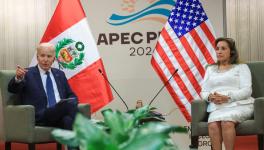World Bank Facing Legal Action for Destroying Fishermen’s Livelihoods in Gujarat

A fishing community in Kutch, Gujarat, has moved several courts in the United States seeking damages from the International Financial Corporation (IFC).
The IFC is the private investment lending arm of the World Bank Group, and is hiding from legal action behind an immunity law. The claims were dismissed by the court where the suit was first filed as well as by the Circuit Court (appellate court) on the basis of immunity.
Now the matter has come up before the Supreme Court of the United States, which will pronounce its decision on 10 May.
The cause of action arose when the IFC loaned $450 million to Coastal Gujarat Power Limited, a subsidiary of Tata. The project was for a 4,150-megawatt coal-based thermal power plant along the coast of Kutch in Mundra.
According to an audit report by the Compliance Advisor Ombudsman (CAO) — who answers only to the president of the World Bank — the project violated several of the IFC's Performance Standards (PS). The human costs prompted the local communities to move court in the United States.
Testimonies from the affected communities have shown the project’s abject disregard for their livelihoods and the environment. The power plant has not put in place a mechanism for cooling water. This raises the temperature of the sea water where it is released, which incidentally happens to be fertile fishing ground. Due to the rising temperature of the water, fish are dying.
As a result of the depleting fish stocks, the communities dependent on fishing for their livelihoods are forced to either go further out to sea or give up and take up other employment such as working on construction sites.
The structure of a thermal power plant requires a lot of water. These plants require an inlet and an outlet for water to pass through. The inlet brings in cool water used in the plant, and the outlet takes away the ‘waste’ hot water.
As per the international norms, the hot water is required to be sufficiently cooled before being released. This allows plants located near the coast to neither deplete nor pollute the groundwater in locations further inland. Another aspect is related to the coal dust and fly ash. The conveyor belts carrying the coal to the plant pass next to where the communities have traditionally dried their fish. The dust from the coal ends up contaminating their dwindling catch. The fly ash from the plant has polluted the wells from which the communities used to draw water. Thus, the water is poisoned, the food is poisoned, and their economic well-being has been jeopardised.
The relief sought against the IFC was based on tort law (tort law relates to those aspects of civil law for which there is no legislation). The Machimar Adhikar Sangharsh Sangathan (MASS) has claimed damages for negligence, negligent nuisance, and trespass.
The IFC, on the other hand, has taken the defence of immunity. This immunity that they claim is based on two statutes of the United States: the Foreign Sovereign Immunities Act (FSIA) and the International Organizations Immunities Act (IOIA).
The FSIA was enacted in 1976 and bestows immunity on foreign sovereigns for their governmental functions and not to their commercial dealings. Whereas the IOIA bestows immunity on international institutions at the level of foreign states. The IOIA was enacted in 1945, a time when sovereigns enjoyed greater immunity than they do now. A precedent in the United States in Atkinson v. Inter-American Development Bank stated that the immunities under IOIA would be that of the 1945 level — which means the IFC enjoys greater immunity than the government of a country.
The petitioners then argued on the question of the IFC waiving its immunity. In Mendaro v. World Bank, the Circuit Court had held that an international organisation's immunity should be waived for actions arising out of external commercial contracts and activities.
The petitioners contended that on this basis the IFC’s immunity is waived as the action sought has arisen out of the IFC's external ‘activities’.
The Circuit Court rejected this contention and stated that the claims could only arise from parties who have a contractual relationship with the international institutions.
What needs to be noted here is that the IFC appears to have disregarded its own internal accountability mechanism (as per the CAO report), and as such has wreaked havoc upon the fishing and farming communities in Mundra.
From a legal standpoint, it is inconceivable that an international institution — particularly one involved in finance — should have greater immunity than a State.
This is not the first time, of course, that the IFC has been involved in financing harmful development projects. The trend that has been noticed is that the IFC operates by indirectly financing such projects through loans to banks. Thus, the IFC has been able to evade direct responsibility for the environmental and social fallouts of hare-brained development.
Get the latest reports & analysis with people's perspective on Protests, movements & deep analytical videos, discussions of the current affairs in your Telegram app. Subscribe to NewsClick's Telegram channel & get Real-Time updates on stories, as they get published on our website.























